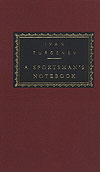What Was on Tolstoy's Bookshelf?

PAGE 5
A Sportsman's Notebook
By Ivan Turgenev
When Tolstoy was first emerging as a writer, Turgenev took him under his wing. But it soon became clear that Tolstoy and Turgenev were destined to get on each other's nerves, both as men and as writers. After minor tensions and incidents, a major rift developed in 1861 after Tolstoy made nasty remarks about how Turgenev was bringing up his daughter (she had been born to a peasant with whom Turgenev had had an affair and instead of abandoning her, as many men did under such circumstances, Turgenev watched over her upbringing.) The insults escalated and Tolstoy took the step of challenging Turgenev to a duel, which Turgenev avoided by blaming the whole affair on himself. The two men didn't communicate again until 1878, when Tolstoy wrote him a reconciliatory letter. Turgenev regretted that Tolstoy withdrew from the literary scene after writing Anna Karenina. He wrote to Tolstoy from his deathbed in 1883, begging him to return to writing literature.
Tolstoy singles out A Sportsman's Notebook, Turgenev's first major prose work, as the one that influenced him. It is a series of vignettes about peasant life, written from the point of view of a member of the gentry class. This work was written in 1852, about ten years before the emancipation of the serfs. It raised consciousness about the plight of the serfs.
Why Tolstoy singled out this work is curious. After reading A Sportsman's Notebook, Tolstoy wrote in his diary that he found Turgenev a hard act to follow. Tolstoy, then having trouble with the "Youth" section of his trilogy Childhood, Boyhood, Youth, may well have been overwhelmed by Turgenev's lyrical ability to evoke the inner world of his subjects. At least when the book came out, Tolstoy was still trying to convince himself that serfdom in Russia was a benign institution. Turgenev went on to write a series of other novels related to topical issues. One of them, Home of the Gentry (also translated as Nest of Gentlefolk) treats many of the same themes as Anna Karenina, such as adultery, peasant-gentry relations and the conflict between Russian and Western values. Like Anna Karenina, this novel was a reaction against Flaubert's novel of adultery, Madame Bovary.
By Ivan Turgenev
When Tolstoy was first emerging as a writer, Turgenev took him under his wing. But it soon became clear that Tolstoy and Turgenev were destined to get on each other's nerves, both as men and as writers. After minor tensions and incidents, a major rift developed in 1861 after Tolstoy made nasty remarks about how Turgenev was bringing up his daughter (she had been born to a peasant with whom Turgenev had had an affair and instead of abandoning her, as many men did under such circumstances, Turgenev watched over her upbringing.) The insults escalated and Tolstoy took the step of challenging Turgenev to a duel, which Turgenev avoided by blaming the whole affair on himself. The two men didn't communicate again until 1878, when Tolstoy wrote him a reconciliatory letter. Turgenev regretted that Tolstoy withdrew from the literary scene after writing Anna Karenina. He wrote to Tolstoy from his deathbed in 1883, begging him to return to writing literature.
Tolstoy singles out A Sportsman's Notebook, Turgenev's first major prose work, as the one that influenced him. It is a series of vignettes about peasant life, written from the point of view of a member of the gentry class. This work was written in 1852, about ten years before the emancipation of the serfs. It raised consciousness about the plight of the serfs.
Why Tolstoy singled out this work is curious. After reading A Sportsman's Notebook, Tolstoy wrote in his diary that he found Turgenev a hard act to follow. Tolstoy, then having trouble with the "Youth" section of his trilogy Childhood, Boyhood, Youth, may well have been overwhelmed by Turgenev's lyrical ability to evoke the inner world of his subjects. At least when the book came out, Tolstoy was still trying to convince himself that serfdom in Russia was a benign institution. Turgenev went on to write a series of other novels related to topical issues. One of them, Home of the Gentry (also translated as Nest of Gentlefolk) treats many of the same themes as Anna Karenina, such as adultery, peasant-gentry relations and the conflict between Russian and Western values. Like Anna Karenina, this novel was a reaction against Flaubert's novel of adultery, Madame Bovary.



